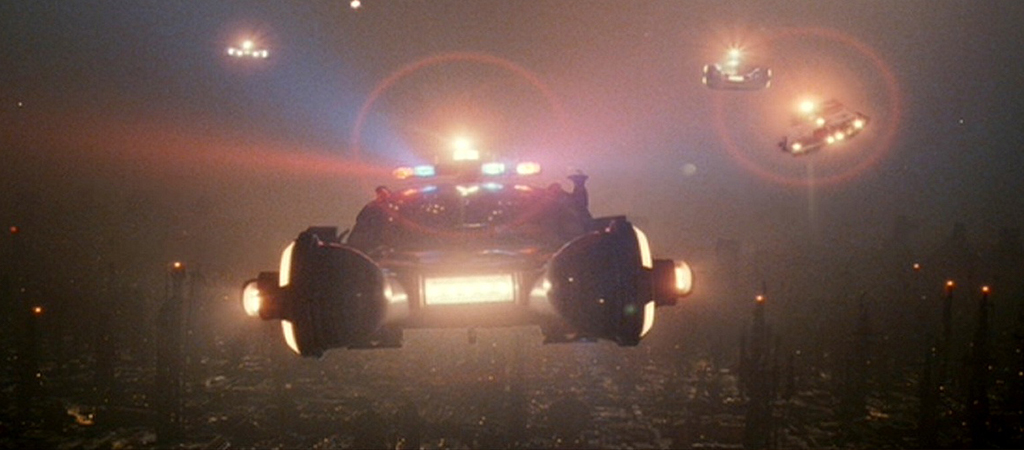What I’m listening to…
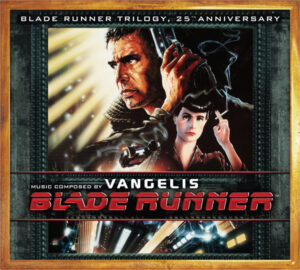 Blade Runner is one of the most influential, evocative, and haunting electronic soundtracks of all time.
Blade Runner is one of the most influential, evocative, and haunting electronic soundtracks of all time.
Vangelis created the score for Ridley Scott’s science-fiction noir film in 1982. He recorded, mixed and produced the entire soundtrack from his Nemo Studios facility in London.
It was a long time before the actual film score was released and we’re still waiting for the definitive version. But more of that shortly.
At the time of the film’s release, an orchestral rendition of the soundtrack was released by the New American Orchestra. This version failed to capture the unique electronic nuances Vangelis meticulously created using his mix of foley recordings and synthesizers.
In 1994. the official score was finally released. Unfortunately, most of the release omits the film’s original cues and remixes the compositions with dialogue from the film. I would consider it more of a remix album than a true representation of the score.
Here is Vangelis’ note from the release:
Most of the music contained in this album originates from recordings I made in London in 1982, whilst working on the score for the film Blade Runner. Finding myself unable to release these recordings at the time; it is with great pleasure that I am able to do so now. Some of the pieces contained will be known to you from the Original Soundtrack of the film, whilst others are appearing here for the first time. Looking back at Ridley Scott’s powerful and evocative pictures left me as stimulated as before, and made the recompiling of this music, today, an enjoyable experience. (Vangelis, Athens, April 1994)
I’m not sure why Vangelis felt the need to tinker with his original recordings. The same thing happened in 2007 for the Blade Runner Trilogy: 25th Anniversary soundtrack release. This 3CD set expands upon the 1994 release but still doesn’t truly represent the music as it was heard in the film.
But there is a solution. For now.
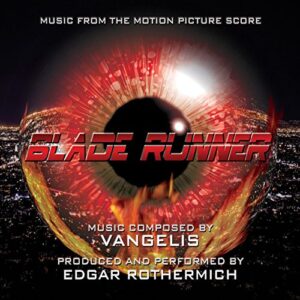 In 2012, composer Edgar Rothermich produced and performed the nearest recreation/representation of the score that I have heard.
In 2012, composer Edgar Rothermich produced and performed the nearest recreation/representation of the score that I have heard.
This proved to be a monumental task for the German composer.
Vangelis’ score was composed entirely by performing on keyboards and recording it directly, so no written transcriptions exist. Rothermich reverse-engineered the score by listening to the original music and a 1982 album mock-up, transcribing it all by ear.
He recreated the sound of 1982 synthesizers and had to decipher if noise heard was due to recording on tape or stylistic choices by the composer.
“The objective from the very beginning was to be as close as possible to the original score as heard in the film,” Rothermich said. “It was never a case of my interpreting the soundtrack. It was essentially a re-recording of the soundtrack music.”
Rothermich’s release is my go-to version of the soundtrack for now. He created a near-indistinguishable rendition of the classic score. If you have never heard the score to Blade Runner then check out the various incarnations on Spotify.
You can find all my latest music, film, and book reviews in my author newsletter. For more content, upcoming releases, and exclusive offers please subscribe here and I’ll deliver my newsletter directly to your inbox once a month.
To read the exclusive first chapter of Monsters, Myths, and Microchips (A Sean Livingstone Adventure: Book 0) for free click here.
What I’m watching…
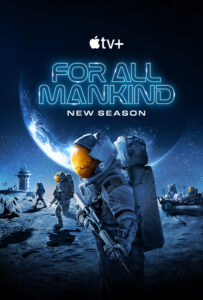 I only discovered For All Mankind recently. I’m about six episodes into season one and really enjoying it.
I only discovered For All Mankind recently. I’m about six episodes into season one and really enjoying it.
This science-fiction series is built around the premise that the Soviets beat the USA to land the first person on the moon. This alternate history poses the question “What if the Space Race had never ended?”
The ramifications are huge. Morale at NASA hits an all-time low and President Nixon is furious. The American effort intensifies in an effort to catch up and beat the Russians to the next milestone.
The series cleverly weaves fictional and historical characters into this alternate timeline. Apollo 11 crewmembers Neil Armstrong, Buzz Aldrin and Michael Collins are featured, along with Wernher von Braun, the Nazi rocket engineer who worked in the US after World War II. The mixture of real vs fictional creates some unique surprises and keeps you guessing.
This is an Apple TV+ produced series and the level of production is of feature film quality.
PS: As of writing this I just found out that Michael Collins has died at the age of 90.
What I’m reading…
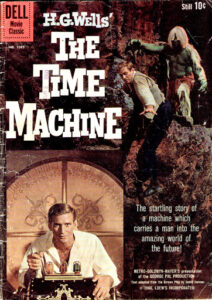 I’m currently reading a classic, The Time Machine by H. G. Wells.
I’m currently reading a classic, The Time Machine by H. G. Wells.
First published in 1895, The Time Machine is the continuation of an idea first explored by Wells in his short story The Chronic Argonauts (1888). Written as a serial seven years before, this short story served as the foundation for the eventual release of The Time Machine.
Interestingly, The Time Machine is told in a frame narrative, a literary technique that tells a story within a story. For a book that is well over 100-years-old, it reads like it was written yesterday.
Wells is known as a futurist and a visionary. His many works foresaw space travel, nuclear weapons, and even the World Wide Web, which he had called the “world brain”.
I’ve always loved the 1960’s film adaptation featuring Rod Taylor, an Australian actor who featured in many Hollywood productions, including Alfred Hitchcock’s classic The Birds.
I couldn’t resist the cover art from this edition, highlighting the action from the film.
Here’s the official synopsis:
When a Victorian scientist invents a machine that allows him to travel to the year A.D. 802,701, he encounters a highly evolved society of people called Eloi, for whom suffering has apparently been replaced by refinement and harmony.
First impressions are misleading, however, and his discovery of the Eloi’s true relationship to the brutish Morlocks who lurk in tunnels beneath them leads him to a horrifying insight into the fate of mankind and its roots in his own time.
